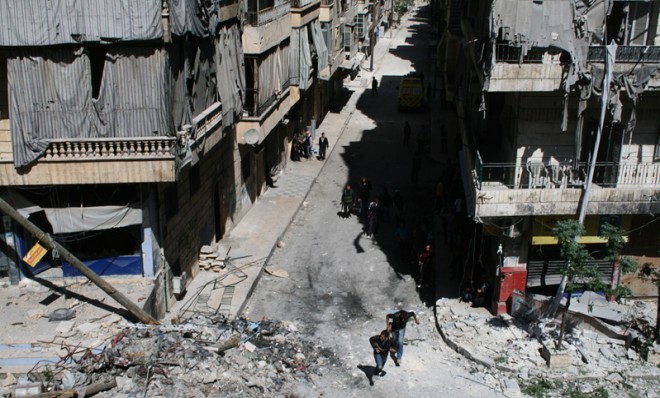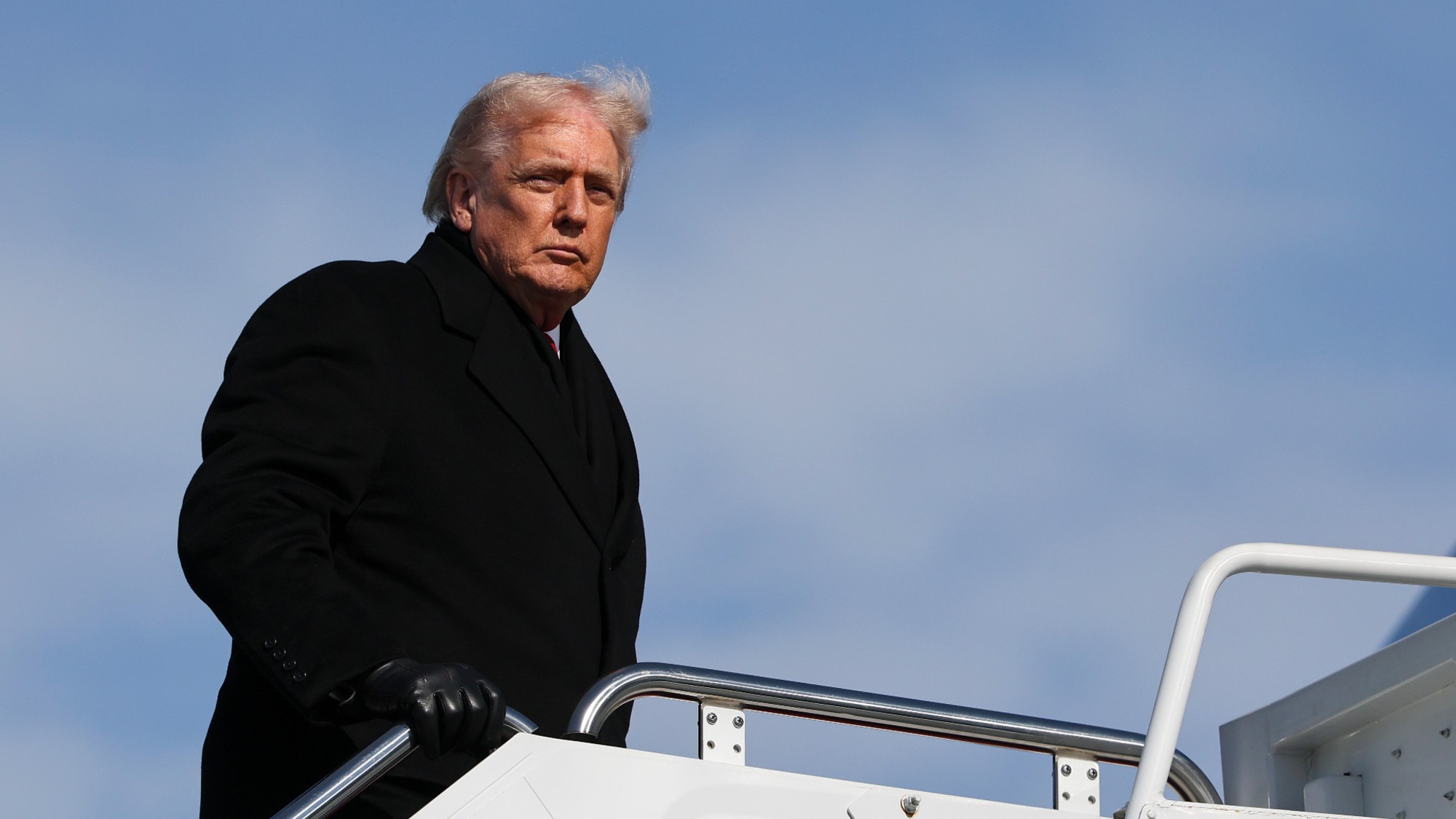Why Obama might finally arm the Syrian rebels
Two years into Syria's grinding civil war, the White House is inching closer to offering lethal assistance


The White House is reportedly considering sending weapons to Syrian opposition forces, a move that would represent a sharp break from the administration's past policy of offering only non-lethal assistance to the rebel groups fighting to topple President Bashar al-Assad.
President Obama has been pressed repeatedly by hawks and humanitarians alike to take a more active role in the conflict, which has dragged on for some two years and claimed an estimated 70,000 lives. Those calls intensified last week amid reports that Assad's regime had used chemical weapons, yet Obama stopped short of calling for more robust involvement at that time.
So what has changed since then?
The Week
Escape your echo chamber. Get the facts behind the news, plus analysis from multiple perspectives.

Sign up for The Week's Free Newsletters
From our morning news briefing to a weekly Good News Newsletter, get the best of The Week delivered directly to your inbox.
From our morning news briefing to a weekly Good News Newsletter, get the best of The Week delivered directly to your inbox.
To be sure, the administration hasn't decided to arm the rebels just yet. According to the Washington Post's Karen DeYoung, who first reported the potential shift, the administration is "moving toward a shipment of arms," but likely won't make a final decision for a few weeks. Furthermore, that option is only one of a range that Obama is said to be considering, with a no-fly zone still on the table as well.
But any shift in policy would likely have its root in Syria's probable use of chemical weapons. The administration has maintained that such actions, if proved, constitute a "red line" that would prompt heavier American involvement. At a press conference on Tuesday, Obama said that it would be a "game changer" if Syria had indeed used chemical weapons. "By game changer, I mean that we would have to rethink the range of options that are available to us," he clarified.
Obama has said the administration has evidence that chemical weapons were used, but added that the U.S. was unsure who had used them. "We don't have a chain of custody," he said Tuesday. "Without evidence of what happened, how can I make a decision what to do?"
That lent ammunition to critics who think Obama has dawdled on taking tougher action. "This latest bit of stalling is absurd," wrote Jennifer Rubin at The Washington Post. "France, Britain, and Israel already believe chemical weapons were used. Is President Obama waiting for Russia to agree?"
A free daily email with the biggest news stories of the day – and the best features from TheWeek.com
Actually, to some degree he is. Part of the delay, says the Post's DeYoung, is to give American diplomats a chance to convince Russia that Syria's probable use of chemical weapons should lead the Russians to reconsider their support for Assad. Obama spoke with Russian President Vladamir Putin on Monday, and Secretary of State John Kerry will head there soon to further those talks.
While several close European allies like France and Britain favor more forceful action, as do several Gulf nations, there is hardly an international consensus. On Tuesday, Obama cautioned against moving too quickly, saying, "If we end up rushing to judgment without hard, effective evidence, then we can find ourselves in the position where we can't mobilize the international community to support what we do." Convincing Russia to soften its support of Assad would go a long way toward easing that concern.
Adding to the administration's rethinking of the issue may also be its growing familiarity with the Syrian opposition. There are numerous groups fighting to topple Assad, and the U.S. has been wary of sending weapons for fear they'd wind up being used against American troops or interests.
From the New York Times' Mark Landler and Rick Gladstone:
The White House had stressed that providing weapons would "further militarize the conflict," and that those weapons could fall into the hands of radical groups. Officials spoke about American shoulder-fired missiles being used against civilian aircraft.
But as the administration has gotten to know members of the Syrian opposition, particularly its military council, a senior official said, it has become more confident of its ability to direct weapons to responsible groups. [New York Times]
Jon Terbush is an associate editor at TheWeek.com covering politics, sports, and other things he finds interesting. He has previously written for Talking Points Memo, Raw Story, and Business Insider.
-
 5 highly hypocritical cartoons about the Second Amendment
5 highly hypocritical cartoons about the Second AmendmentCartoons Artists take on Kyle Rittenhouse, the blame game, and more
-
 ‘Ghost students’ are stealing millions in student aid
‘Ghost students’ are stealing millions in student aidIn the Spotlight AI has enabled the scam to spread into community colleges around the country
-
 A running list of everything Donald Trump’s administration, including the president, has said about his health
A running list of everything Donald Trump’s administration, including the president, has said about his healthIn Depth Some in the White House have claimed Trump has near-superhuman abilities
-
 The billionaires’ wealth tax: a catastrophe for California?
The billionaires’ wealth tax: a catastrophe for California?Talking Point Peter Thiel and Larry Page preparing to change state residency
-
 Bari Weiss’ ‘60 Minutes’ scandal is about more than one report
Bari Weiss’ ‘60 Minutes’ scandal is about more than one reportIN THE SPOTLIGHT By blocking an approved segment on a controversial prison holding US deportees in El Salvador, the editor-in-chief of CBS News has become the main story
-
 Has Zohran Mamdani shown the Democrats how to win again?
Has Zohran Mamdani shown the Democrats how to win again?Today’s Big Question New York City mayoral election touted as victory for left-wing populists but moderate centrist wins elsewhere present more complex path for Democratic Party
-
 Millions turn out for anti-Trump ‘No Kings’ rallies
Millions turn out for anti-Trump ‘No Kings’ ralliesSpeed Read An estimated 7 million people participated, 2 million more than at the first ‘No Kings’ protest in June
-
 Ghislaine Maxwell: angling for a Trump pardon
Ghislaine Maxwell: angling for a Trump pardonTalking Point Convicted sex trafficker's testimony could shed new light on president's links to Jeffrey Epstein
-
 The last words and final moments of 40 presidents
The last words and final moments of 40 presidentsThe Explainer Some are eloquent quotes worthy of the holders of the highest office in the nation, and others... aren't
-
 The JFK files: the truth at last?
The JFK files: the truth at last?In The Spotlight More than 64,000 previously classified documents relating the 1963 assassination of John F. Kennedy have been released by the Trump administration
-
 'Seriously, not literally': how should the world take Donald Trump?
'Seriously, not literally': how should the world take Donald Trump?Today's big question White House rhetoric and reality look likely to become increasingly blurred
